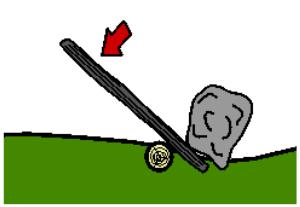Class 1 Lever: Difference between revisions
From DT Online
No edit summary |
mNo edit summary |
||
| (9 intermediate revisions by the same user not shown) | |||
| Line 1: | Line 1: | ||
[[File:MechanismsClass1Lever.jpg| | [[File:MechanismsClass1Lever.jpg|300px|right]] | ||
__TOC__ | |||
=====Description===== | |||
This is the most common type of lever. With a '''Class 1 Lever''' the '''fulcrum''' is in the middle, like a see-saw. The '''effort''' is on one side and the '''load''' is on the other. | This is the most common type of lever. With a '''Class 1 Lever''' the '''fulcrum''' is in the middle, like a see-saw. The '''effort''' is on one side and the '''load''' is on the other. | ||
=====Features and Uses===== | |||
Common examples of Class 1 Levers include: a [https://en.wikipedia.org/wiki/Crowbar_%28tool%29 crowbar], [[scissors]], [https://en.wikipedia.org/wiki/Pincers_%28tool%29 pincers], [[tinsnips]], many [https://en.wikipedia.org/wiki/Bicycle_brake push-bike brake levers and calipers] and [https://en.wikipedia.org/wiki/Weighing_scale#Balance balance type weighing scales]. | Common examples of Class 1 Levers include: a [https://en.wikipedia.org/wiki/Crowbar_%28tool%29 crowbar], [[scissors]], [https://en.wikipedia.org/wiki/Pincers_%28tool%29 pincers], [[tinsnips]], many [https://en.wikipedia.org/wiki/Bicycle_brake push-bike brake levers and calipers] and [https://en.wikipedia.org/wiki/Weighing_scale#Balance balance type weighing scales]. | ||
=====Animations===== | |||
* Examples from '''[[2100 Animated Mechanical Mechanisms|Nguyen Duc Thang's]]''' YouTube Channel '''[[2100 Animated Mechanical Mechanisms]]''' | |||
{| | |||
|- | |||
| [https://youtu.be/TbdkXOo0z94 '''Parallel Jaw Pliers'''] - two back pins slide in the slots and to get parallel clamping surfaces of the jaws: | |||
* For each jaw, distances to clamping surface from center line of the slot and from center of the hole are equal. | |||
* Centre distances of the holes on the handle are equal. | |||
''(the red springs tend to move the jaws apart from each other)''. | |||
| {{#ev:youtube|TbdkXOo0z94|200x200|right||frame|loop=1&autoplay=0&playlist=TbdkXOo0z94}} | |||
|} | |||
{{Construction Kits Buyers Guide}} | |||
[[Category:Primary]] | |||
[[Category:Secondary]] | |||
[[Category:Levers]] | [[Category:Levers]] | ||
Latest revision as of 13:51, 28 August 2016
Description
This is the most common type of lever. With a Class 1 Lever the fulcrum is in the middle, like a see-saw. The effort is on one side and the load is on the other.
Features and Uses
Common examples of Class 1 Levers include: a crowbar, scissors, pincers, tinsnips, many push-bike brake levers and calipers and balance type weighing scales.
Animations
- Examples from Nguyen Duc Thang's YouTube Channel 2100 Animated Mechanical Mechanisms
Parallel Jaw Pliers - two back pins slide in the slots and to get parallel clamping surfaces of the jaws:
(the red springs tend to move the jaws apart from each other). |
|
Click top left to enlarge |









